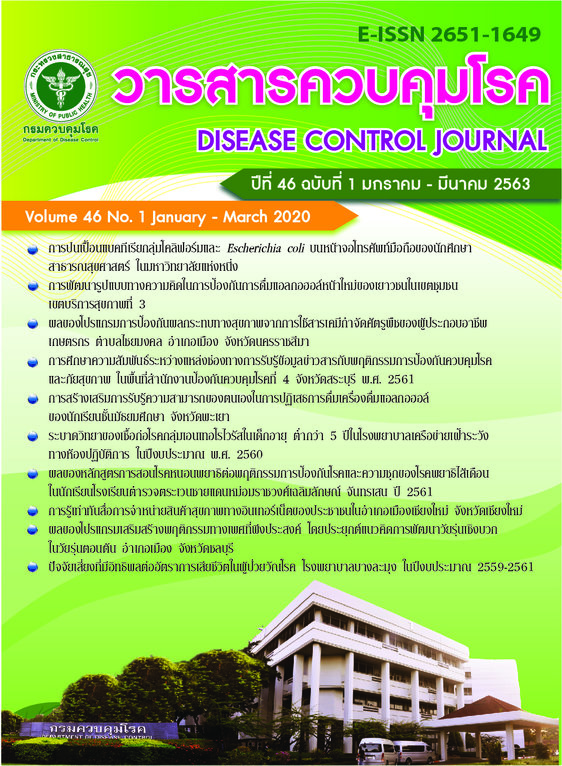Effects of preventive health program on pesticides use among farmers in Chai Mongkhon Sub-district, Mueang District, Nakhon Ratchasima Province
DOI:
https://doi.org/10.14456/dcj.2020.3Keywords:
farmer, use of pesticides, preventive behavior from pesticide useAbstract
The objective of this quasi-experimental research was to study the effects of preventive health program on chemical use among farmers in Ban Bu Tan, Chai Mongkhon Sub-district, Mueang District, Nakhon Ratchasima Province. The sample of this study was 48 local farmers exposed to pesticides at least one year in Ban Bu Tan, Chai Mongkhon Sub-district, Mueang District, Nakhon Ratchasima Province. The sample was selected based on a purposive sampling. The variables of study included perceived benefits, perceived obstacles, perceived self-efficacy for preventing pesticide use, and behavior of pesticide use. The research instruments were the knowledge development program on prevention of health impacts from pesticide use and the questionnaire with the reliability of 0.84, 0.69, 0.92 and 0.98. Data were analyzed using statistics including percentage, mean, standard deviation and paired samples t-test. The results of this research indicated that after the experiment, the respondents had on average higher perceived benefits, perceived obstacles, perceived self-efficacy for preventing pesticide use, and improved behavior of pesticide use than before with a statistical significance level of 0.05. The findings of this study indicated that the development program on the prevention of health risks associated with use of pesticides could enhance farmers’ perceived benefits, perceived obstacles, perceived self-efficacy for preventing pesticide use, and behavior of pesticide use.
Downloads
References
Office of Natural Resources and Environmental Policy and planning. Indicators on the importation volumes of hazardous substances for use in agricultural sector [Internet]. [cited 2018 Nov 10]. Available from : https://www.onep.go.th/env_data/2016/01_60 (in Thai)
Karnchanajira C. Thai population health and food security. Bangkok: Amarin Printing & Publishing; 2012. (in Thai)
Pradabwong A. Pollution from hazardous chemicals in Thailand. Environmental Health Journal 2010;12:3-13. (in Thai)
Chaiklieng S, Praengkrathok S. Risk assessment on pesticide exposure by biological monitoring among farmers: a case study in Tambon Kangsanamnang, Nakhon Ratchasima Province. Srinagarind Med J 2013;28:382-9. (in Thai)
Water Quality Management Bureau. Folk wisdom and the reduction in the use of pesticides [Internet]. Bangkok: Water Quality Management Bureau; 2013 [cited 2018 Dec 10]. 83 p. Available from www.pcd.go.th/public/Publications/template/peticide_wisdom56.pdf (in Thai)
Bangkokbiznews. Medical advice on the prevention of occupational diseases. Data on healthcare utilization under the national health security program [Internet]. 2015 Mar 28 [cited 2018 May 12]. Available from: https://www.bangkokbiznews.com/news/detail/640950 (in Thai)
Buranatrevedh S, Sweatsriskul P. Model development for health promotion and control of agricultural occupational health hazards and accidents in Pathumthani, Thailand. Ind Health 2005;43:669-76.
National Health Security Office. Healthcare utilization rates under National Health Security System [Internet]. 2018 Sep 9 [cited 2019 Dec 12]. Available from: https://prachatai.com/journal/2018/09/78623 (in Thai)
Mingchai P. The effect of health belief program on self-prevention behaviors from the use of chemical pesticides by farmers in the area of responsibility of Lu Sub-district Health Promoting Hospital, Pathum Ratchawongsa District, Amnat Charoen Province. Journal of ODPC 10th Ubon Ratchathani 2017;15:54-65. (in Thai)
Chantaramanee N. Behaviors of chemical pesticide uses and effectiveness of an occupational health education program of safety knowledge among farmers in upriver area, Phayao Province. Journal of Safety and Health 2017;10:35-45. (in Thai)
Danyuthasilpe C. Pender’s health promotion model and its applications in nursing practice. Songklanagarind Journal of Nursing. 2018;38:132-41. (in Thai).
Nakhon Ratchasima Provincial Agricultural Extension Office. Agriculturist registration database [Internet]. [cited 2019 May 25]. Available from: https://www.khorat.doae.go.th/web/index.php/2014-11-27-04-36-03 (in Thai)
Chaimongkol Subdistrict Municipality. Conditions and demographic data of the population [Internet]. [cited 2018 May 22]. Available from: https://www.chaimongkon.go.th/base.php?content_id=7 (in Thai)
Chaimongkol Tambon Health Promoting Hospital. Screening results for residual chemicals among farmers by means of finger stick. Nakhon Ratchasima: Chaimongkol Tambon Health Promoting Hospital; 2017. (in Thai)
Phosri R. Statistics for research. Bangkok: Chulalongkorn University Press; 2006.
Yodchan S, Suntayakorn C, Noosorn N, Prachanban P. Effects of health belief program on pesticide prevention behavior among the farmers. Journal of Nursing and Health Sciences 2011;5:45-54. (in Thai)
Rodniam J, Saetiaw S, Jantaweemuang W. Perceived benefits, perceived barriers, perceived self-efficacy and health promoting behaviors, and health status of nursing students. Nursing Journal of the Ministry of Public Health 2014;23:88-97. (in Thai)
Rachcha M, Samranchit S, Saen Thao J, Suktakue S, Atsuwansuwan A. Protection behavior of chemical pesticides among farmers of Ban Thung Nang Khruan, Chalaesud District, Thong PhaPhum District, Kanchanaburi Province. Journal of Nursing Public Health and Education 2017;18:84-94. (in Thai)
Hanklang S, Kaewboonchoo O, Suwan-Ampai P, Morioka I. Effectiveness of an intervention to reduce pesticide exposure among rice farmers in Nakhon Ratchasima Province: applying social learning theory. Journal of Public Health Nursing 2017;31:183-200. (in Thai)
Downloads
Published
How to Cite
Issue
Section
License
Articles published in the Disease Control Journal are considered as academic work, research or analysis of the personal opinion of the authors, not the opinion of the Thailand Department of Disease Control or editorial team. The authors must be responsible for their articles.






